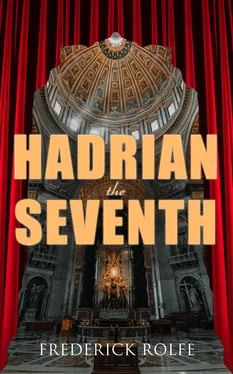Frederick Rolfe - Hadrian the Seventh
Здесь есть возможность читать онлайн «Frederick Rolfe - Hadrian the Seventh» — ознакомительный отрывок электронной книги совершенно бесплатно, а после прочтения отрывка купить полную версию. В некоторых случаях можно слушать аудио, скачать через торрент в формате fb2 и присутствует краткое содержание. Жанр: unrecognised, на английском языке. Описание произведения, (предисловие) а так же отзывы посетителей доступны на портале библиотеки ЛибКат.
- Название:Hadrian the Seventh
- Автор:
- Жанр:
- Год:неизвестен
- ISBN:нет данных
- Рейтинг книги:5 / 5. Голосов: 1
-
Избранное:Добавить в избранное
- Отзывы:
-
Ваша оценка:
- 100
- 1
- 2
- 3
- 4
- 5
Hadrian the Seventh: краткое содержание, описание и аннотация
Предлагаем к чтению аннотацию, описание, краткое содержание или предисловие (зависит от того, что написал сам автор книги «Hadrian the Seventh»). Если вы не нашли необходимую информацию о книге — напишите в комментариях, мы постараемся отыскать её.
Hadrian the Seventh — читать онлайн ознакомительный отрывок
Ниже представлен текст книги, разбитый по страницам. Система сохранения места последней прочитанной страницы, позволяет с удобством читать онлайн бесплатно книгу «Hadrian the Seventh», без необходимости каждый раз заново искать на чём Вы остановились. Поставьте закладку, и сможете в любой момент перейти на страницу, на которой закончили чтение.
Интервал:
Закладка:
THE GATHERING OF THE STORM
M. Baltaicheff's murder has drawn the world's attention to the present state of things in Russia— which is much worse than most people imagine. The present movement is not confined to the students alone, though it is that class which makes most noise. The revolutionary fever has gained a hold of the lower classes— Brains and Brawn as we said yesterday have combined, and the combination is formidable. More significant, however, than anything else, if it be true, is the statement of the Neue Freie Presse that during the demonstrations in the Kasan Square in Petersburg a detachment of infantry was called upon to fire upon the crowd, the men thrice refused to obey, were marched back to barracks, no enquiry being subsequently held, and that similar incidents have occurred elsewhere. With universal service the Army is only the people in uniform. Any popular feeling must sooner or later touch the Army, and if the soldiers cannot be depended upon to shoot, the game of absolutism is up. The great cataclysm may be nearer at hand than is generally supposed.
SIGNS OF SMOULDERING REVOLT
PETERSBURG.— In two of the districts of the Poltava Government workmans' riots have occurred in consequence of the systematic repression of "Little Russia" by "Greater Russia." The journal Pridjeprowski Krai gave the first intimation of the state of affairs, and was promptly suspended for eight months.
PETERSBURG.— The murder of the Procurator of the Holy Synod is regarded in a measure as the symptom of the general situation in Russia. It is reported that the chateau of the Duke of Mecklenburgh in S.E. Russia has been pillaged and destroyed by rioters.
BERLIN.— On the arrival of the express train from Berlin at Wirballen on the Russian frontier today, a passenger was arrested, and Nihilist documents were discovered in his trunks. This is the third Nihilist arrest within the fortnight. The Berlin police have received information from Petersburg of numerous revolutionists having recently left France. They are now maintaining from Berlin a vigorous agitation against the Tsar's Government. From London, too, the whereabouts of several suspects have been reported. In most cases the Berlin authorities are powerless to effect arrests, but they always supply full information to Russia, so that suspicious characters are always detained in passing the frontier.
ANARCHY ADVANCING
The Kreuzzeitung , which is unusually well-informed in Russian affairs, expresses the opinion that one of the immediate consequences of the triumph of Japan will be a general rising of the Russian peasants against their landlords, and of the army against the aristocracy. The same paper declares that revolutionary agents of Social Democratic tendencies have long been systematically poisoning the minds of the people.
He turned back to THE GATHERING OF THE STORM, and read the ominous paragraph again. "Warning enough, in all conscience," he said: "first, the Public Prosecutor assassinated at Odessa, then the Chief of Secret Police of Petersburg, then the Procurator of the Holy Synod; and now a hekatombe, sovereign, royalty, aristocracy, government, bureaucracy, all annihilated, and Anarchy in excelsis. France will take fire at any minute now, that's absolutely certain. Oh, how horrible! But we're all Christians, Flavio; and this is only one of the many funny ways in which we love one another."
He rose and went to the window. The yellow cat deliberately stretched himself, yawned, and followed; and proceeded to carry out a wonderful scheme of feints and ambuscades in regard to a ping-pong ball which was kept for his proper diversion. The man looked on almost lovingly. Flavio at length captured the ball, took it between his fore-paws, and posed with all the majesty of a lion of Trafalgar Square. Anon he uttered a little low gurgle of endearment, fixing the great eloquent mystery of amber and black velvet eyes, tardy, grave, upon his human friend. No notice was vouchsafed. Flavio got up; and gently rubbed his head against the nearest hand.
"My boy!" the man murmured; and he lifted the little cat on to his shoulder. He went downstairs. He could not work; and he was going to take an easy; and he wanted a novel, he said to his landlady. He feared that he had read all the books in the house. Yes, and those in the drawing-room too. After a quarter of an hour, application to a neighbour produced three miserable derelicts, a nameless sixpenny shudder, a Braddon, and an Edna Lyall. Not to seem ungracious, he took them upstairs; and pitched them into a corner, to be returned upon occasion. That salient trait of his character, the desire not to be ungracious, the readiness to be unselfish and self-sacrificing, had done him incalculable injury. This world is infested by innumerable packs of half-licked cubs and quarter-cultivated mediocrities who seem to have nothing better to do than to buzz about harassing and interfering with their betters. Out of courtesy, out of kindness, he was used to give way; but all the same he tenaciously knew and clung to his original purpose. He knew that delay was his enemy: yet he invariably would stand aside and let himself be delayed. And now towards the end of his youth, he was poor, lonely, a misanthropic altruist.
He returned to his armchair, breathing a long sigh of irritation and exhaustion: broke up three cigarette dottels for a (tobacco famine was afflicting him), rolled them in a fresh paper, and applied a match. Flavio, with an indulgent protestant mew, bounded from his knee to a bedroom chair; and coiled himself up to sleep.
The armchair was placed directly in front of the fireplace, the ordinary garret-coloured iron fireplace and mantel of a suburban lodging-house attic. To the grey wall above the mantel a large sheet of brown packing-paper was tacked. On this background were pinned photographs of the Hermes of Herculaneum, the terra-cotta Sebastian of South Kensington, Donatello's liparose David and the vivid David of Verrocchio, the wax model of Cellini's Perseys, an unknown Rugger XV. prized for a single example of the rare feline-human type, and the O.U.D.S. Sebastian of Twelfth Night of 1900. Tucked into the edges of these were Italian picture post-cards presenting Andrea del Sarto's young St. John, Alessandro Filipepi's Primavera, a page from an old Salon catalogue showing Friant's Wrestlers, another from an old Harper's Magazine shewing Boucher's Runners, a cheap and lovely chromo of an olive-skinned black-haired cornflower-crowned Pancratius in white on a gold ground, the visiting-cards of five literary agents, and a post-card tersely inscribed Verro precipitevolissimevolmente. The mantel-shelf contained stone bottles of ink, pipes, a miniature in a closed morocco case, a cast of Cardinal Andrea della Valle's seal from Oxford, two pairs of silver spectacles in chagreen cases, four tiny ingots of pure copper, a sponge gum bottle, and an open book with painted covers showing Eros at the knees of Psyche and a mysterious group of divers in the clear of the moon. The door was at a yard to the left of the fireplace, at a right-angle. Uncared-for clothes, black serge and blue linen, hung upon it. A small wooden wash-stand stood between the door and the armchair, convenient to the writer's hand. A straw-board covered the hole in its top; and supported ink-bottles, pens, pen-knife, scissors, a lamp, a biscuit-tin of cigarette-dottels, sixteen exquisite Greek intaglj. On the lower shelf stood a row of books-of-reference. Between the wash-stand and the fire was the chair whereon Flavio slumbered (if one may use so indelicate a word of so delicate a cat). About four feet of wall extended on the right of the fireplace. Pinned there were a pencil design for a Diamastigosis , a black and white panel of young Sophokles as Choregos after Salamis done on the back of an Admiralty chart, a water colour of Tarquinio Santacroce and Alexander VI., a pair of foils and fencing masks, and a curious Greco-Italian seal shewing St. George as a winged-footed Perseys wearing what looked like the Garter Mantle and labelled ϕυλαξ α’ρχης. Substitutes for shelves stood against the lower part of the wall. A rush-basket, closed and full of letters, set up on end, supported files of the American Saturday Review , the Author , the Outlook , the Salpinx, Reynards's , and the Pall Mall Gazette , and a feather broop for dusting books and papers or for correcting Flavio when obstreperous. Another rush-basket, placed length-wise on a bedroom chair, held a row of books, ms. note-books, duodecimo classics of Plantin, Estienne, Maittaire, with English and American editions of the writer's own works. The third wall was pierced by two small windows, wide open to the full always. A chest of drawers protruded endways into the room. Its top was used as a standing desk. The drawers opened towards the fourth wall. Sheaves of letters in metal clips hung at the end. Between it and the armchair, more shelves were contrived of rush-baskets placed beneath and upon a small wooden table. Books-of-reference, lexicons, and a box of blank paper, congregated here convenient to the writer's hand. The little table drawer contained note-paper, envelopes, sealing-wax, and stamps. The whole was arranged so that, when once ensconced in the armchair before the fire with his writing-board on his knees, the digladiator could reach all his weapons by a simple extension of his arms. The attic was eleven feet square, low-pitched, and with half the ceiling slanting to the fourth foot from the floor on the fourth wall. Here was a camp-bed, a small mirror, and a towel-rail, three pairs of two- six- and ten-pound dumb-bells, a pair of boots on trees, a bottle of eucalyptus and a spray-producer.
Читать дальшеИнтервал:
Закладка:
Похожие книги на «Hadrian the Seventh»
Представляем Вашему вниманию похожие книги на «Hadrian the Seventh» списком для выбора. Мы отобрали схожую по названию и смыслу литературу в надежде предоставить читателям больше вариантов отыскать новые, интересные, ещё непрочитанные произведения.
Обсуждение, отзывы о книге «Hadrian the Seventh» и просто собственные мнения читателей. Оставьте ваши комментарии, напишите, что Вы думаете о произведении, его смысле или главных героях. Укажите что конкретно понравилось, а что нет, и почему Вы так считаете.











